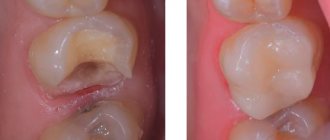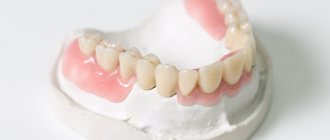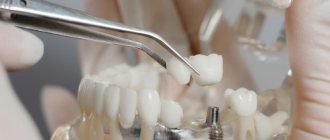Removable dentures – what guarantees does the dental clinic take?
Any dental clinic today provides a guarantee for dentures, that is, it stipulates a period during which the structure is guaranteed not to fail, of course, if it was not damaged accidentally or intentionally by the patient himself. By law, if a product breaks down for reasons beyond the patient’s control, the clinic is obliged to repair or completely replace the orthopedic device free of charge. For more information about what warranty obligations dental centers undertake and how they are fulfilled, read further in this article.
What if the clinic doesn’t give a guarantee?
According to the Law “On the Protection of Consumer Rights”, in the case of the provision of paid services, the contractor has the right to establish and independently determine the warranty period for them (but this is a right, not an obligation). However, the absence of such a period does not relieve the clinic from liability to the patient for poor-quality service provided.
If deficiencies are identified during the use of orthopedic structures, the patient has the right to demand their correction no later than within 2 years from the date of acceptance of the work performed. If significant deficiencies are discovered - within 10 years. True, in this case you will have to prove your case, perhaps with the involvement of the courts.
Warranty period for prosthetics
In accordance with the legislation of the Russian Federation, any dental clinic must provide a guarantee for a removable denture, and usually this is for a period of 2 years. In some situations, this period increases to 5 years. It is important that during this time the patient regularly visits a specialist, undergoes preventive examinations and carefully cares for the installed structure. Otherwise, the blame for the failure of the product may fall on the shoulders of the patient himself, and then the fulfillment of warranty obligations on the part of the clinic is out of the question.
As for preferential prosthetics, in this case the warranty for a removable prosthesis is usually 1 year, for a fixed prosthesis - 2 years, in accordance with the order of the Moscow Department of Health.
In accordance with the legislation of the Russian Federation, any dental clinic must provide a guarantee for a removable denture, and this is usually for a period of 2 years
Average treatment success rates in a medical organization
Endodontic treatment
The result of treatment in each specific case depends not only on its quality, but also on the general reaction of the body and the condition of the dental system as a whole.
Placement of implants
Complete implant engraftment is guaranteed in 97% of cases (service life of 5 years or more).
In all cases, the patient is guaranteed:
- examination and recording of the patient’s general health before implantation in order to identify possible contraindications to the installation of implants;
- use of certified titanium implants from leading foreign companies;
- painless installation of the implant;
- medical monitoring of the implant healing process.
Removal of a tooth
It is guaranteed that in all cases tooth extraction will occur:
- painless;
- with adequate surgical intervention.
Free elimination of possible complications in the postoperative period is guaranteed:
- inflammation;
- bleeding;
- edema;
- pain.
( 1 rating, average 5 out of 5 )
Regulations on the provision of guarantees in dentistry
This is a document designed to regulate possible controversial situations that may arise between dentistry and the patient. At the same time, each medical institution develops its own regulations on warranty services, but always on the basis of legislative acts in force in the territory of the Russian Federation.
The following information must be included in the regulations:
- period of fulfillment of warranty obligations,
- services covered by the guarantee,
- conditions under which re-treatment is possible free of charge,
- conditions under which the clinic will have to return the payment previously made by the patient.
Before signing a contract for prosthetics in a particular institution, carefully study this provision. If you have any doubts about certain points, do not hesitate to discuss them with your doctor.
Features of responsibility for seals
As a rule, the warranty on a light seal is valid even if a minor defect is discovered. These are defects that do not interfere with the use of the tooth, that is, chewing or biting, and do not cause pain:
- violation of fit along the edge;
- discoloration from the outer edge;
- recurrence of caries at the edges.
Of course, a guarantee for teeth is provided by law and if there are significant deficiencies in the work:
- loss of filling;
- her mobility;
- secondary caries caused by improper manipulation;
- fracture of part of the tooth crown.
Why do they refuse?
They can quite legally refuse if:
- you have already applied to another doctor to restore the same tooth and have not notified your attending physician;
- did not fulfill hygiene requirements in good faith. It is difficult to prove this, but for a professional it is possible;
- There are conditions or illnesses that can affect the progress or result of work. For example, you became pregnant, you caught a cold, neoplasms appeared, or chronic diseases worsened.
There are also difficult cases: is there a guarantee for seals if they are destroyed? For free restoration on a “patch”, no more than 50% of the damage is damaged. If it is destroyed, you will need to claim reimbursement for medical services. Then you will have to do all the filling work again.
What does the clinic’s warranty obligations include?
As a rule, the clinic undertakes to conduct a mandatory inspection of the installed orthopedic system to assess its appearance and quality of functionality. This also includes free preventive examinations, the timing of which is agreed upon in advance with the treating specialist, but not more than once every 6 months.
The doctor also undertakes to monitor the dynamics of the consequences of treatment and take appropriate measures in a timely manner if there is a risk of complications. The finished and installed prosthetic device must be functional and aesthetic, and its operation should not cause significant inconvenience or provoke the development of inflammatory processes.
The doctor undertakes to monitor the dynamics of the consequences of treatment and take appropriate measures in a timely manner if there is a risk of complications.
Warranties for different types of dentures
Currently, specialists have a wide selection of orthopedic structures of various types at their disposal. These include fixed single crowns and bridges, and removable structures made of acrylic, nylon, polyurethane and other materials, as well as fixed systems that are fixed to pre-implanted implants. And for each type of product, the clinic sets its own warranty period, of course, based on legally prescribed standards.
The warranty period and the service life of the prosthesis are not the same thing. The warranty period is determined by the clinic, while the actual operating period of the device is usually several times longer. For example, the actual service life of clasp models starts from 8 years, of course, subject to regular care and systematic adjustment of the product by an orthopedist. The service life of dentures made from ordinary acrylic, as a rule, does not exceed 5 years, and they are guaranteed for an average of 1-2 years. As for nylon, Acry-Free and QuattroTi dentures, products made from these soft materials usually last at least 7 years or longer, again provided that excellent hygiene and extensive care are maintained.
Many dental clinics are increasing the warranty period offered in order to attract customers. And here it is important to pay attention to the reputation of honey. institution, carefully study the reviews of its patients. Unfortunately, there are cases when clinics first lure patients in this way, and then back down and make all possible attempts to avoid fulfilling their obligations.
Types of defects that the clinic must eliminate free of charge
If the work of dentists was performed with violations, then after a detailed examination they are classified into simple deficiencies and significant deficiencies. The first include minor and easily removable errors. For example, deformation of the anatomical shape of the dentures, recurrence of caries under the structure, poor marginal fit of the product, change in its color, breaking off hooks and clasps on a partial removable structure, inaccurate positioning, loss of inlays and veneers. Doctors undertake to correct such deficiencies within the time frame established by the guarantee.
A significant disadvantage is considered to be work that does not allow the patient to benefit from the results of treatment for its intended purpose. Or a very serious medical error that cannot be corrected and requires large expenses to eliminate. If such problems are discovered, the patient has the right to make demands for their elimination, even if the warranty period has expired, but only within the service life of the product - usually the period is about 10 years.
Important ! The current legislation of the Russian Federation obliges dental clinics to correct all deficiencies within the established warranty periods, and significant deficiencies - within the established service life of the prostheses.
How to extend the life of an orthopedic system
Today, prosthetics are available to a much wider range of patients than 20 years ago. However, in order to restore teeth efficiently and for a long time, you still need to pay a considerable amount for treatment. Therefore, each patient expects to be able to use the installed structure for as long as possible. You can extend the service life of a denture if you follow some recommendations from experts in the field of orthopedics:
- if a prosthesis is installed in the mouth, be it a metal-ceramic or zirconium crown, a bridge, a removable structure or a fixed one on implants, in this case the patient should absolutely not chew too hard food, open bottles with his teeth, etc. It is important to try to exclude all potentially traumatic factors, sharp temperature changes in food and drinks, which can lead to microcracks in the acrylic base,
- it is necessary to clean plaque from artificial teeth every morning and evening using a brush with soft bristles and a non-abrasive paste, and also immerse the denture in a disinfectant solution 1-2 times a week if we are talking about a removable structure,
- Every six months it is necessary to visit a hygienist to remove plaque and deposits in a dental office, and also undergo regular professional examinations. examinations so that the doctor has the opportunity to promptly identify early signs of pathological processes.
You can extend the service life of a denture if you follow the recommendations of experts.
Artificial teeth must be treated with the same care as your own. The best option for dental restoration is implantation. At the same time, this is also the most expensive way to restore the beauty and functionality of your smile. Therefore, many are saved by removable structures, which, however, are not able to stop the atrophic processes in the bone tissue in the area of missing teeth.
Bone tissue gradually decreases in height and volume. Therefore, an important point in caring for the prosthesis is also to regularly visit your orthopedist to assess the position of the structure and its relocation.
Warranty service for prostheses
It was already mentioned above that it is important to distinguish between two separate concepts - the service life of the prosthesis and the guarantee for it that the dental clinic offers. The legislation of the Russian Federation defines a number of dental services for which guarantees must be provided. So, for example, in the event of damage to a prosthetic product due to the fault of the clinic, the latter undertakes to make appropriate repairs or completely replace the structure, and in other situations, even return the money that the patient paid for the treatment received.
Is it possible to replace a product if it is cracked?
If a crack appears on the orthopedic device and the warranty period has not yet expired, the patient has every right to contact the dental clinic to replace the product. However, first you need to establish the reason why the damage appeared on the structure.
If a crack appears on the orthopedic device and the warranty period has not yet expired, the patient has every right to contact the dental clinic to replace the product
Of course, most often this happens due to poor quality of material or workmanship. However, insufficient care and improper use of the prosthesis on the part of the patient can also lead to this kind of trouble. Typically, in such cases, the product is taken for examination, and based on its conclusion, the clinic decides on its further actions.
Is a light seal included in the policy?
According to compulsory medical insurance in 2022, filling material is free for policy holders. However, there are nuances. Before placing a light-curing filling, you need to clarify whether it is included in the compulsory medical insurance in 2019.
Domestic filling material is provided free of charge. This is cement. It is no worse than other materials, quite strong. Composite or metal may also be offered.
Light-curing fillings are modern and quite expensive. They are not only strong, but also do not differ in color from the tooth. They are installed using ultraviolet light, which promotes hardening.
According to compulsory medical insurance, a light filling, like a chemical filling, can be placed free of charge.
This is stated in the Guidelines for paying for treatment through compulsory health insurance (Appendix 7). According to it, light seals are included in the compulsory medical insurance policy as a free service. The policy owner has the right to modern filling material.
However, the realities differ from the prescribed rules. Due to the lack of government money allocated for health insurance, light fillings are placed only when indicated, most often on the front teeth. In other cases, you should rely on paid imported reflective material. Installation of a photopolymer filling in a private clinic can be free if it is still under warranty.
Important! Due to lack of money in the healthcare system, light-curing material is rarely purchased.
Light fillings are considered the strongest and most resistant to damage, which is why clinics offer them for a fee. It is illegal. If the doctor insists on paying for light filling material that is included in the compulsory medical insurance list, you must immediately call the insurance company directly from the dental office.










